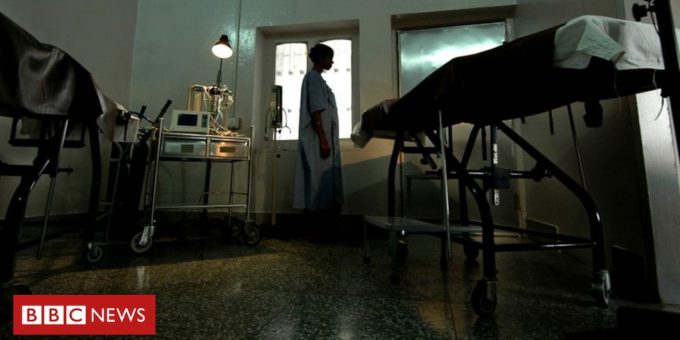
Image copyright
Getty Images
More than a million abortions in India have been “compromised” by the lockdown, research says.
India’s grinding national coronavirus lockdown complicated life for women trying to access safe abortions, and now cities are bringing back restrictions, reports Menaka Rao.
In the last week of May, a 20-year old college-going woman in India’s capital, Delhi, found out that she was pregnant.
The woman, Kiran, whose name has been changed to protect her identity, had already taken abortion pills on the advice of a friend who was a doctor. But they did not work and so, her only option was a surgical abortion.
India, however, was still under lockdown to curb the spread of coronavirus. It had enforced some of the world’s most severe restrictions, stopping air travel, trains and buses, and confining people to their homes as much as possible.
Although hospitals stayed open, they were instructed to only provide essential services. So many of the biggest ones shut down their outpatient departments and cancelled elective surgeries.
While contraception and abortion counted as essential, the lockdown only made it harder than usual for women to access sexual or reproductive health services.
According to recent research, some 1.85 million abortions in India are likely to be “compromised” by Covid-19 – an estimated 15.6 million take place in India every year.
That could mean women undergoing a surgical procedure because of a delayed medical abortion (the use of pills) or unintended pregnancies forcing women to choose unsafe abortions.
Poor access
“Whenever disaster strikes, nobody talks about sexual and reproductive health,” said Jasmine Lovely George, who runs Hidden Pockets, a platform that improves access to sexual and reproductive health. She said that her organisation’s care line saw a sudden spike in calls during the lockdown.
Even buying a pregnancy testing kit was hard for some women as they were stuck at home, she said.
“Many women were home from college, or working from home. We heard that usually it was the father who was stepping out, and the maximum they could ask for was sanitary napkins.”
Image copyright
Getty Images
Restrictions have continued amid India’s surging Covid-19 case numbers
Doctors and public health advocates in various Indian cities told me that they had received calls for help from women unable to access safe abortions. Some even said they knew of instances where women seeking abortions were turned away from hospitals, or asked to come later, pushing women towards a surgical abortion.
Dr Suchitra Wadhwa of Delhi’s Family Planning Association said that she got calls from Delhi, and the neighbouring state of Uttar Pradesh seeking help related to medical abortions. But she couldn’t do that because it’s illegal for doctors to provide abortion without documenting it, and they themselves are often uncomfortable to do so.
“I heard of cases who sought abortion from government hospitals in Mumbai in the first trimester being turned away. The doctors would ask them to wait a few more weeks. We had to find other doctors who would help these women,” said Dr Shilpa Shroff, who works with Asia Safe Abortion Campaign.
And this was even harder for poorer women, and those in rural India.
Vijaylaxmi Rao, who runs the Family Planning Association’s clinic in the southern city of Bellary, said a widow in her late 30s came to her clinic in a rickshaw. She was nearly four-and-a-half months pregnant.
“She was unable to step out for nearly a month after knowing she was pregnant,” Ms Rao said.
Image copyright
Getty Images
Access to safe reproductive health often suffers at times like this, public health advocates say.
But Ms Rao’s clinic was not licensed to handle a second trimester abortion.
“She was angry and she was crying. We referred her to the nearby government hospital, knowing very well that they will mostly turn her away. Most of our clients complained about it,” Ms Rao said.
In rural Jharkhand in central India, youth leader, Anki Kasma Turi, said she tried to help two women who were seeking an abortion in the second week of March, even before India’s lockdown was fully in effect.
But they were turned away as restrictions had already begun. One of these women had three children, and the other had four.
“Both are from farming communities and did not want to have more children. Now they are forced to continue their pregnancies,” Ms Turi said.
The problem persists
Although the national lockdown has ended, work from home practices continue in most of India, and all colleges have not reopened yet. Many cities – such as Bangalore and Chennai – have enforced local lockdowns amid recent spikes in infection rates, and more cities could do the same as the pandemic peaks in different places at different points in time.
The poor access to reproductive health is not a problem exclusive to India, and some countries have found solutions. The UK, for instance, has allowed medical abortions following a doctor’s consultation via video link, telephone conference or other electronic means.
“The government should allow medical abortion to be conducted via telemedicine. It also needs to build strong referral systems for women who need abortion services,” said Vinoj Manning, the chief executive officer of IPAS foundation, a non-profit that works in the area of reproductive health.
Image copyright
Getty Images
Hospitals saw long lines during the lockdown as they tried to limit services
Back in Delhi, Kiran finally contacted Inayat Kakar, a health researcher who is also part of a group of public health professionals, the Medical Support Group, that helps people access medical care.
“Her parents were paranoid about Covid-19 infection and were not letting her step out at all, and definitely not for the long durations that she needed to see a doctor,” Ms Kakar said.
Kiran eventually told her parents, but they still had difficulty finding a doctor as her pregnancy had already crossed 14-15 weeks, and was closer to the 20-week legal limit prescribed by Indian law.
“Her mother called several gynaecologists. We called many gynaecologists, but to no avail. Some hiked their rates up to 70,000 rupees ($933;£738) for an abortion,” Ms Kakar said.
Given the chaos and anxiety surrounding Covid-19, it’s become hard to gauge which clinics and hospitals are functional and which aren’t, said Dr Sana Contractor, who has helped several women access safe abortion services.
It was she and her colleagues at the Medical Support Group that finally helped Kiran find a doctor who could provided her a safe abortion.
But not all women are that fortunate.












